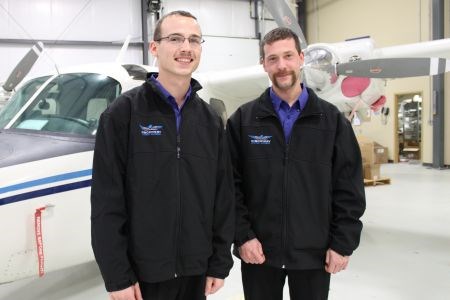When it comes to flying the big blue skies, there's very little grey area, according to Matt Neumann: either you love it or you hate it.
There are those who complete one flight and can't wait to get into the cockpit again, while others can't wait to get out—and vow never to step foot in a small plane again. But, usually, the exhilaration that comes from taking the controls while soaring through the air overrides any lingering fear.
“For the most part, people get in and they get hooked,” said Neumann, chief flight instructor at Discovery Aviation Academy. “It's just so much fun.”
The academy, which launched this past fall at the Sudbury airport, offers prospective pilots a new twist to earning their wings. It's one of the first flight schools to start up out of an existing aviation company.
Discovery Air is the parent company of Dryden-based Hicks & Lawrence, which provides fire suppression services for the Ministry of Natural Resources. Since its services aren't needed in the winter months, the company saw an opportunity to put its idle facility and aircraft to use while training up the next generation of pilots.
The advantage, said program manager Jason Fogg, is that when the company needs to add to its ranks, it has a pool of well-trained, skilled pilots to pull from.
“To have a flight school as part of a big company like that, it really bridges the gap between just going to school and learning how to fly and actually becoming a pilot in a company,” Fogg said.
Following its launch in October, 15 students signed up to study at the school, which offers ground school training as well as in-flight instruction, but Fogg expects those numbers to jump as the industry scrambles to keep up with demand.
Growth in countries like India and China, along with the launch of new airlines, has resulted in a shortage of airline pilots across the globe, Fogg said. That veteran fliers are retiring faster than new pilots can be trained hasn't helped the situation.
“It's not just in the North,” Fogg said. “But it is apparent in the North, because when places like Air Canada need to hire 50 new pilots, then they pull from the smaller places below them, so it's just a chain reaction.”
An opportunity to head up a new flight training school proved irresistible for Atikokan-born Fogg, who worked for Hicks & Lawrence after training at the University of Western Ontario. Neumann, who hails from Red Lake and studied at Seneca College, is equally enthusiastic about putting his stamp on the fledgling school.
Neumann was inspired to become a pilot as a child after going up with his father, while Fogg's combined love for motorized vehicles and video games propelled him into the industry. The pair say their youth helps them relate to new students and provide up-to-date instruction on the newest trends in the industry.
“Our focus is going to be getting a lot of people their commercial licence and getting them set for a career in aviation,” Neumann said. “But there are a lot of people who want to buy a little bush plane and be able to take their friends and family up, and right now we're serving the people who've always had the dream of learning how to fly.”
Non-commercial pilots can choose between the more restrictive recreational pilot permit, which is less expensive and takes fewer hours to complete, or the more common private pilot's licence, which qualifies pilots to fly family and friends around the globe.
Transport Canada requires a minimum 45 hours of flight time—the national average is 60 to 65—in addition to passing in-flight and written exams to qualify for the private pilot's licence. Neumann estimated it takes the average person eight months to a year to become qualified.
As the school grows, Neumann said there will be opportunity for expansion and the hiring of additional employees. Currently, three flight school employees and four engineers are engaged at Discovery Air's Sudbury location, but the company's ranks swell to 850 across the country.
Those who are curious about flying, but aren't quite ready to take the throttle, can avail themselves of the academy's secondary service and go on a sightseeing tour with one of the pilots.
But be warned: taking to the skies may induce a new passion for flight.
“A lot of people are afraid of flying, or afraid of the idea of flying,” Fogg said. “But you get them in an airplane and you give them control of the airplane and it changes things.”



